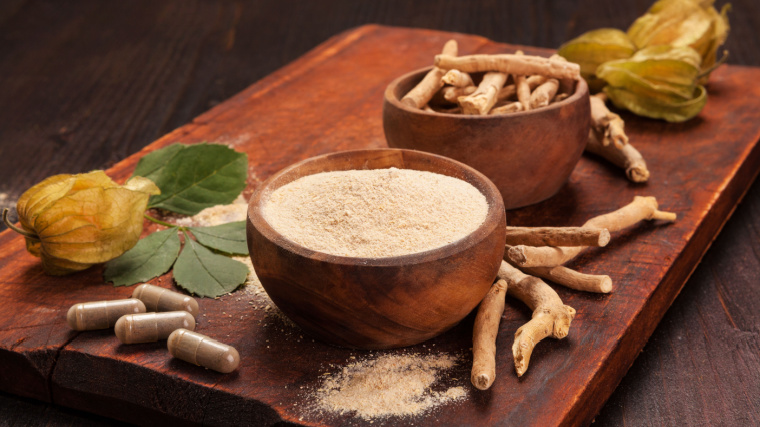Ashwagandha is an herb that has quickly gained popularity in Western health and fitness circles of late. What makes ashwagandha special are its active ingredients, called withanolides, which are believed to have various health effects like lessening inflammation and supporting your body’s ability to adapt to stress.

You might have heard about its potential to reduce stress and boost performance. But with all the buzz, it’s easy to get lost in the hype. So, are these claims backed by solid research, or is it all just marketing magic? We’re taking a closer look to see what the actual science says about this popular supplement. Here are the Ashwagandha benefits that are up to snuff.
What Is Ashwagandha?
Ashwagandha — an herb scientifically known as Withania somnifera and commonly referred to as Indian ginseng — is a longstanding staple in Ayurvedic medicine in India. (1)
Ayurveda is a historical medicinal system based on ancient practices and writings. It relies on a natural approach to health, combining diet, exercise, lifestyle, and various products (mostly from plants) such as ashwagandha. (2)

[Read More: The 13 Best Protein Powders]
Ashwagandha is a Sanskrit word that translates to “horse odor,” which describes the unique smell of the plant’s roots. (3) In Ayurvedic medicine, ashwagandha is categorized as a rasayana for its positive influence on overall health and vitality, a bhalya for its ability to increase strength, and a vjikara for its qualities as an aphrodisiac. (4)
Different parts of the plants are thought to have different benefits, but most ashwagandha supplements use extracts from the roots. Although it’s often sold and supplemented on its own, Ayurvedic medicine usually incorporates it into other practices, as well. (3)
How Does Ashwagandha Work?
Ashwagandha is known as an adaptogen, which is a substance thought to improve the body’s ability to (as the name implies) adapt to stress.
While this Ayurvedic herb contains a number of potentially beneficial compounds, evidence suggests that the effects of ashwagandha are explained by its withanolides. (5)
[Read More: The 12 Best Multivitamins On the Market]
Withanolides are thought to work through multiple mechanisms that regulate numerous chemical pathways in the body, including the hypothalamic-pituitary-adrenal (HPA) axis, immune system, cardiometabolic system, and various thyroid and sex hormones that regulate metabolism and sexual function.
Their exact mechanisms are still being studied, but they could bind to certain cell receptors, act directly on DNA, or both. (5)
How Should I Take Ashwagandha?
Studies have used doses of ashwagandha extract ranging from 120 milligrams (mg) up to five grams (g) per day, but the most common dosage is 600 mg per day, divided into two doses. When it comes to improving sleep, 600 mg seems to be the minimum effective dose, but other benefits might require higher doses of up to 1,000 mg. (6)(7)
Benefits of Ashwagandha
The potential health benefits of ashwagandha are numerous. It has been studied in the context of mental health, cognition, immune support, physical fitness, body composition, cardiometabolic health, and cancer.
[Read More: The 16 Best Pre-Workout Supplements]
Note: these benefits haven’t all been studied in placebo-controlled clinical trials, and research is still ongoing.
More Restful Sleep and Better Cognitive Function
Ashwagandha has been shown to improve subjective well-being, memory, focus, stress, and anxiety levels. While the effects on sleep seem fairly small, participants report feeling more alert and less anxious after waking up. It’s likely that these effects could be synergistic; it makes sense that people would feel better in the morning after a good night’s sleep. (7)(8)(9)
It’s also worth noting that these effects are more pronounced in people who report high levels of stress, anxiety, and sleep issues at baseline.

[Read More: Best BCAA Supplements]
Animal and cell culture models suggest that ashwagandha could support brain health by promoting the formation and protection of neurons, and there’s some evidence that it could increase levels of neuronal growth factors in humans, but this research is still in its early stages. (10)(11)
Immune System Support
Ashwagandha may have anti-inflammatory properties, as well. It can suppress the production of certain cytokines, which are chemicals that cells use to communicate and regulate immune activity.
Its influence on the HPA axis and cytokine production could help support immune defense while preventing chronically elevated immune activity associated with autoimmune disease. (12)(13)
[Read More: The 12 Best Women’s Multivitamins]
Although ashwagandha has been studied for the prevention of respiratory infections and the treatment of arthritis, much more research is needed to confirm its potential benefits. It may also have anti-cancer effects because of its antioxidant properties, but cancer-related studies in humans have only reported its mental health benefits so far. (14)(15)
Better Performance, Body Composition, and Metabolic Health
In healthy adults, ashwagandha appears to support multiple aspects of physical performance. Studies have found improvements in aerobic fitness, power output, and muscle strength in both trained and untrained populations, perhaps by increasing the oxygen-carrying protein hemoglobin. (16)(17)(18)

[Read More: The 12 Best Supplements for Muscle Growth]
There’s some mixed evidence that ashwagandha could help improve body composition in sedentary people by reducing body fat and increasing lean muscle mass, but more research is needed in this area. It could also reduce blood sugar levels in people with metabolic syndrome. (19)
Your Takeaways
- While more research is needed to confirm most of its purported benefits, ashwagandha could help you get a better night’s sleep, feel more alert in the morning, handle stress throughout the day, and perform better in both strength and endurance sports.
- Ashwagandha’s effects might be more pronounced in people who are already under stress, feeling anxious, or experiencing sleep disturbances.
- Most studies use doses of 600 to 1,000 mg per day, divided into two equal doses. It’s unclear whether higher doses are more effective, or if you could develop a tolerance with daily use.
- Emerging evidence suggests that ashwagandha could improve body composition, help regulate blood sugar, and promote neuronal formation. It may also have anti-cancer properties. Much more research is needed to confirm these early findings.
- Ashwagandha appears to be safe for most people, but there have been some reports of thyroid dysfunction and liver toxicity, and some products could be contaminated with dangerous levels of heavy metals.
Stress Less for More Gains
Strength training is incredible for your body and mind — but it still causes your body significant stress. As an athlete who lifts heavy weights, make sure you’re prioritizing lowering your stress levels during the rest of your days and nights, too. That’s where ashwagandha comes in.
[Read More: The 10 Best Protein Powders for Muscle Gain]
Consider taking an ashwagandha supplement if you’re aiming to sleep better, rest more effectively, and generally improve your overall health. Be prepared to enjoy life that much more.
FAQs
When you’re considering taking any supplement, you’ve probably got a lot of questions. And we have a lot of answers.
Most studies use doses of 600 to 1,000 mg of ashwagandha per day, but it’s unclear whether long-term use could lead to tolerance and reduce its effectiveness. Because it acts on neurotransmitters, it’s possible that long-term, daily use could lead to reduced potency, but this hasn’t been studied yet.
So far, ashwagandha appears to be safe, but it could cause drowsiness in some people. However, there are some case reports of people experiencing thyroid dysfunction and liver toxicity while taking ashwagandha. (20)(21)
As with other herbal supplements, ashwagandha products could also be contaminated with high levels of heavy metals and other potentially harmful substances.
Since little is known about its safety profile and potential pharmaceutical drug interactions, it’s wise to check with a healthcare provider before adding ashwagandha to your supplement stack.
Ashwagandha has the potential to provide numerous health benefits. It’s most often used to relieve stress and anxiety, reduce cortisol levels, and improve sleep quality. It may also have anti-inflammatory properties and could improve cognition, cardiometabolic health, exercise performance, and body composition.
Ashwagandha can improve both the duration and quality of sleep — or how rejuvenating it is — in people with or without insomnia. It has also been shown to potentially improve alertness and anxiety levels after waking.
References
- Kulkarni, S. K., & Dhir, A. (2008). Withania somnifera: an Indian ginseng. Progress in neuro-psychopharmacology & biological psychiatry, 32(5), 1093–1105.
- National Center for Complementary and Integrative Health. (n.d.). Ayurvedic Medicine: In-Depth.
- Chandrasekhar, K., Kapoor, J., & Anishetty, S. (2012). A prospective, randomized double-blind, placebo-controlled study of safety and efficacy of a high-concentration full-spectrum extract of ashwagandha root in reducing stress and anxiety in adults. Indian journal of psychological medicine, 34(3), 255–262.
- Baliga, M. S., Meera, S., Vaishnav, L. K., Rao, S., & Palatty, P. L. (2013). Rasayana drugs from the Ayurvedic system of medicine as possible radioprotective agents in cancer treatment. Integrative cancer therapies, 12(6), 455–463.
- Paul, S., Chakraborty, S., Anand, U., Dey, S., Nandy, S., Ghorai, M., Saha, S. C., Patil, M. T., Kandimalla, R., Proćków, J., & Dey, A. (2021). Withania somnifera (L.) Dunal (Ashwagandha): A comprehensive review on ethnopharmacology, pharmacotherapeutics, biomedicinal and toxicological aspects. Biomedicine & pharmacotherapy = Biomedecine & pharmacotherapie, 143, 112175.
- Bonilla, D. A., Moreno, Y., Gho, C., Petro, J. L., Odriozola-Martínez, A., & Kreider, R. B. (2021). Effects of Ashwagandha (Withania somnifera) on Physical Performance: Systematic Review and Bayesian Meta-Analysis. Journal of functional morphology and kinesiology, 6(1), 20.
- Cheah, K. L., Norhayati, M. N., Husniati Yaacob, L., & Abdul Rahman, R. (2021). Effect of Ashwagandha (Withania somnifera) extract on sleep: A systematic review and meta-analysis. PloS one, 16(9), e0257843.
- Gopukumar, K., Thanawala, S., Somepalli, V., Rao, T. S. S., Thamatam, V. B., & Chauhan, S. (2021). Efficacy and Safety of Ashwagandha Root Extract on Cognitive Functions in Healthy, Stressed Adults: A Randomized, Double-Blind, Placebo-Controlled Study. Evidence-based complementary and alternative medicine : eCAM, 2021, 8254344.
- Salve, J., Pate, S., Debnath, K., & Langade, D. (2019). Adaptogenic and Anxiolytic Effects of Ashwagandha Root Extract in Healthy Adults: A Double-blind, Randomized, Placebo-controlled Clinical Study. Cureus, 11(12), e6466.
- D’Cruz, M., & Andrade, C. (2022). Potential clinical applications of Ashwagandha (Withania somnifera) in medicine and neuropsychiatry. Expert review of clinical pharmacology, 15(9), 1067–1080.
- Kuboyama, T., Tohda, C., & Komatsu, K. (2005). Neuritic regeneration and synaptic reconstruction induced by withanolide A. British journal of pharmacology, 144(7), 961–971.
- Bhat, J., Damle, A., Vaishnav, P. P., Albers, R., Joshi, M., & Banerjee, G. (2010). In vivo enhancement of natural killer cell activity through tea fortified with Ayurvedic herbs. Phytotherapy research : PTR, 24(1), 129–135.
- Tharakan, A., Shukla, H., Benny, I. R., Tharakan, M., George, L., & Koshy, S. (2021). Immunomodulatory Effect of Withania somnifera (Ashwagandha) Extract-A Randomized, Double-Blind, Placebo Controlled Trial with an Open Label Extension on Healthy Participants. Journal of clinical medicine, 10(16), 3644.
- Chopra, A., Lavin, P., Patwardhan, B., & Chitre, D. (2004). A 32-week randomized, placebo-controlled clinical evaluation of RA-11, an Ayurvedic drug, on osteoarthritis of the knees. Journal of clinical rheumatology : practical reports on rheumatic & musculoskeletal diseases, 10(5), 236–245.
- Biswal, B. M., Sulaiman, S. A., Ismail, H. C., Zakaria, H., & Musa, K. I. (2013). Effect of Withania somnifera (Ashwagandha) on the development of chemotherapy-induced fatigue and quality of life in breast cancer patients. Integrative cancer therapies, 12(4), 312–322.
- Ziegenfuss, T. N., Kedia, A. W., Sandrock, J. E., Raub, B. J., Kerksick, C. M., & Lopez, H. L. (2018). Effects of an Aqueous Extract of Withania somnifera on Strength Training Adaptations and Recovery: The STAR Trial. Nutrients, 10(11), 1807.
- Sandhu, J. S., Shah, B., Shenoy, S., Chauhan, S., Lavekar, G. S., & Padhi, M. M. (2010). Effects of Withania somnifera (Ashwagandha) and Terminalia arjuna (Arjuna) on physical performance and cardiorespiratory endurance in healthy young adults. International journal of Ayurveda research, 1(3), 144–149.
- Pérez-Gómez, J., Villafaina, S., Adsuar, J. C., Merellano-Navarro, E., & Collado-Mateo, D. (2020). Effects of Ashwagandha (Withania somnifera) on VO2max: A Systematic Review and Meta-Analysis. Nutrients, 12(4), 1119. https://doi.org/10.3390/nu12041119
- Raut, A. A., Rege, N. N., Tadvi, F. M., Solanki, P. V., Kene, K. R., Shirolkar, S. G., Pandey, S. N., Vaidya, R. A., & Vaidya, A. B. (2012). Exploratory study to evaluate tolerability, safety, and activity of Ashwagandha (Withania somnifera) in healthy volunteers. Journal of Ayurveda and integrative medicine, 3(3), 111–114.
- Verma, N., Gupta, S. K., Tiwari, S., & Mishra, A. K. (2021). Safety of Ashwagandha Root Extract: A Randomized, Placebo-Controlled, study in Healthy Volunteers. Complementary therapies in medicine, 57, 102642.
- Tandon, N., & Yadav, S. S. (2020). Safety and clinical effectiveness of Withania Somnifera (Linn.) Dunal root in human ailments. Journal of ethnopharmacology, 255, 112768.
Featured Image: Eskymaks / Shutterstock